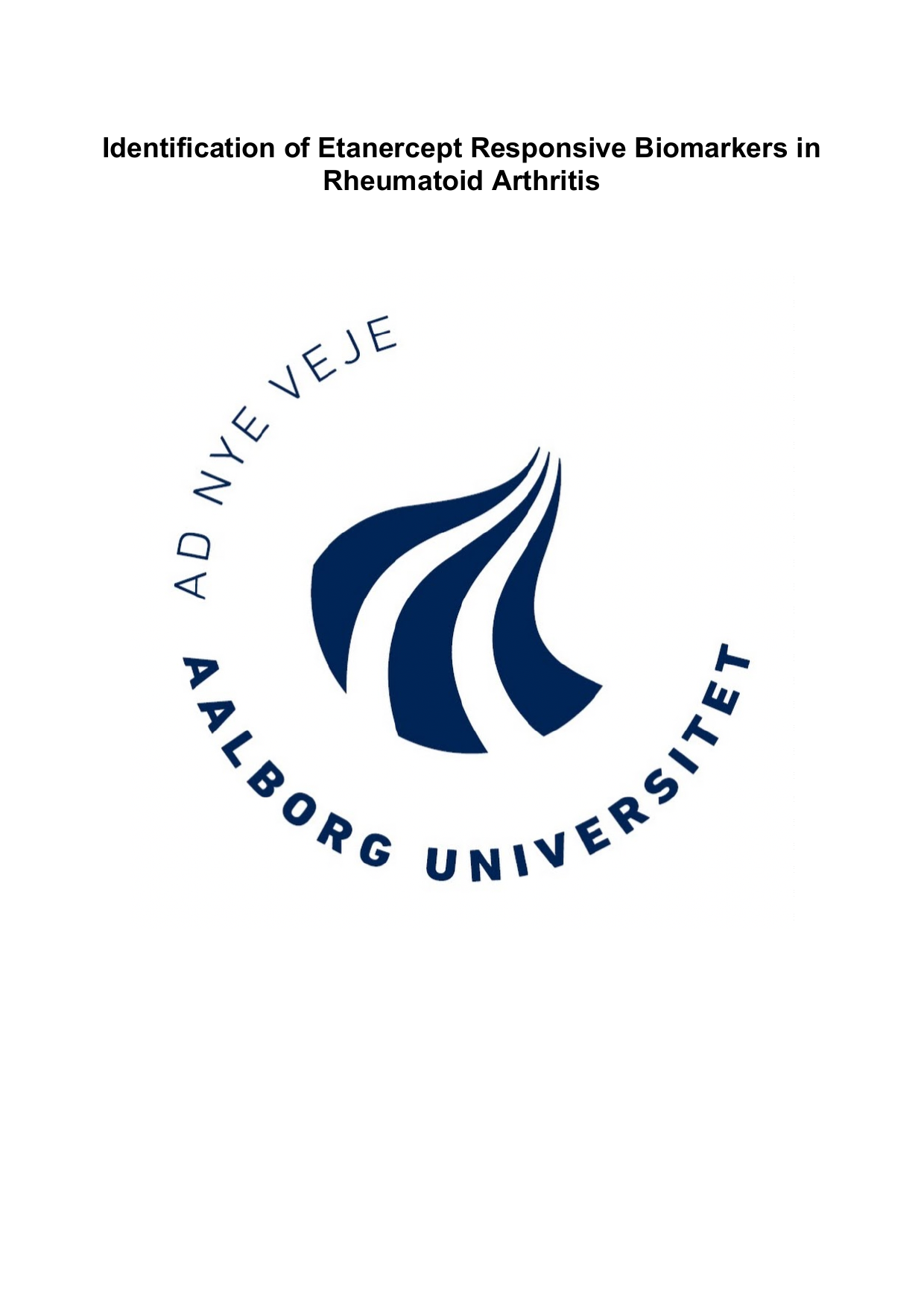
Identification of Etanercept Responsive Biomarkers in Rheumatoid Arthritis
Translated title
Identikfikation af Etanercept-Responsive Biomarkører i Reumatoid Artritis
Author
Term
4. term
Publication year
2020
Submitted on
2020-05-29
Pages
36
Abstract
Introduktion: Reumatoid artrit (RA) eller leddegigt forårsager inflammation i kroppens led, og hvis sygdommen forbliver ubehandlet eller utilstrækkeligt behandlet kan der opstå irreversibel ledskade samt komorbiditeter såsom kardiovaskulære sygdomme eller inflammatoriske lungesygdom. Intro-duktionen af bDMARDs har revulotioneret behandlingsmulighederne for patienter med RA. En af disse bDMARDs er etanercept; et fusionsprotein, der er skabt ved genetisk rekombination. Etanercept udøver sine effekter ved at inhibere binding af TNF til sin tilsigtede receptor, hvilket resulterer i nedsat cellulær respons. Dog opnår 30% til 40% af RA-patienter ikke tilstrækkelig remission eller lav syg-domsaktivitet som resultat af anti-TNF-behandling. Formål: Formålet med dette studie var at undersøge effekterne af langtidsbehandling af RA med eta-nercept, og at identificere biomarkører, der kan benyttes til at indikere behandlingsrespons i disse pati-enter. Metoder: Serumprøver indsamlet fra 12 etanercept-behandlede RA-patienter før behandling, samt efter henholdsvis tre, seks og 12 måneders behandling blev analyseret for ændringer i deres proteom med LC-MS/MS. Herudover blev koncentrationen af cfDNA målt i prøverne. Resultater: 79 proteiner blev fundet ændret som resultat af behandlingen, enten efter tre, seks eller 12 måneders behandling. Ud af disse blev fem potentielle biomarkører for etanercept-respons identifice-ret. Ydermere identificerede vi et kontinuerligt, signifikant fald i cfDNA koncentrationen i prøverne Konklusion: Fem potentielle biomarkører for etanercept-respons i RA patienter blev identificeret. Især vitamin D-binding protein, pregnancy zone protein, og plasma kallikrein var interessante som mulige biomarkører. Herudover er det muligt at et fald i cfDNA-koncentration kan benyttes som bio-markør for opnåelse af remission i RA-patienter. Ydereligere studier er nødvendige for at få mere vi-den om de potentielle biomarkører og deres relation til inflammation i RA.
Introduction: Rheumatoid arthritis (RA) causes inflammation of the joints which if left untreated or inadequately treated may result in joint- and bone destruction and facilitate development of systemic co-morbidities such as cardiovascular diseases and inflammatory lung diseases. The introduction of bDMARDs have revolutionized the treatment options for RA. One of these bDMARDs is etanercept, a fusion protein made by genetic recombination. Etanercept works as a decoy receptor for TNF-a resulting in decreased cellular signaling from TNF-a binding to its target receptor. However, about 30% to 40% of RA patients do not achieve remission or low disease activity in response to treatment with anti-TNF-a treatment. Aim: The aim of this study was to investigate the effects of long-term treatment of RA with etanercept and to identify biomarkers to monitor treatment response in these patients. Methods: Serum samples collected from 12 etanercept-treated RA patients before treatment, and after three, six, and 12 months of treatment, respectively were analyzed proteomically by LC-MS/MS and analyzed by quantification of cfDNA levels. Results: 79 proteins were found to have a significantly altered abundance as a result of etanercept treatment either for three, six or 12 months. Out of these, five potential etanercept responsive bi- omarkers were identified. Furthermore, a continuous, significant fall in cfDNA concentration was observed in the serum samples. Conclusion:Five candidate biomarkers of etanercept treatment response in RA patients were identified. Especially vitamin D-binding protein, pregnancy zone protein, and plasma kallikrein were found to be interest- ing potential biomarkers. Furthermore, lowered cfDNA concentrations may have the ability to be used as a biomarker of RA remission. Future studies are needed to expand the knowledge of the potential biomarkers and their relation to inflammation in RA.
Keywords
Documents
